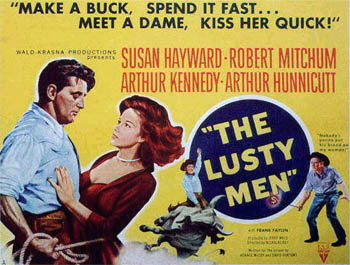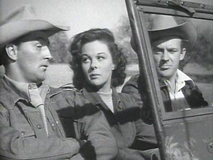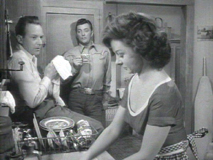The Lusty Men (Nicholas Ray, 1952)

The first few brief sequences in Nicholas Ray’s
rip-roaring rodeo flick The Lusty Men
tell us visually almost everything that we need to know about the director’s
interest in this story. We see legendary rider Jeff McCloud (Robert Mitchum)
straddling a bucking bronco in a display of his masculine prowess. We see him as
he’s thrown from that horse in a demonstration of how that masculinity becomes
self-destructive. We see him limp across the deserted ring after the show as the
debris from the bygone celebration swirls around him. Afterwards, McCloud
returns to his childhood home to find it dilapidated and owned by another
person. With no home to return to, he makes a literal attempt to recapture his
childhood as he climbs under his raised house to find a stash of childhood
treasures. This affecting, wordless scene shows how in Ray’s films, the
protagonists speak most loudly with their actions. Though Jeff McCloud might not
be a man of many words, we see that he’s a man with secrets who is capable of
sentimentality. When he does finally start to open up verbally, to the man who
has purchased the farm he grew up on, the two of them communicate in the
language of the everyman, with simple but sincere platitudes and philosophies.
Perhaps the most telling moment of all occurs when McCloud compares his calling
to a career in horse riding to a preacher’s calling to the Lord. In Ray’s
eyes, McCloud’s choice of profession might define him, but in no way does that
choice limit his personal investment in the work he does. Even in the most
seemingly mindless types of grunt work, the director sees the possibility of
grace (a fitting stance for a man who frequently worked as a hired gun in the
Hollywood studio system).
 After McCloud’s personality is established, The
Lusty Men becomes more plot-driven, focusing less on his loneliness and more
on his relationship with a young married couple who are attempting to earn
enough money to purchase McCloud’s old home. The breadwinner Wes (Arthur
Kennedy) convinces McCloud to teach him the ropes of riding. Louise (Susan
Hayward), Wes’ headstrong wife is initially reticent to allow her husband to
risk his life in the rodeo ring, but she acquiesces when Wes tells her she lacks
guts. Before long, the trio set off on the rodeo circuit, lodging at a series of
trailer parks and spending their evenings in rowdy bars as they hustle from town
to town chasing after prize money. The film presents a portrait of America's
capitalist system as a never-ending series of competitions, and as a result, the
characters are rarely able to relate to each other without the buzz of commerce
drowning out what they say. The integrated stock footage of rodeo performances
genuinely adds to the excitement because it is suggested that each ride could be
the last for these cowboys. The pursuit of fame has rarely looked so gritty in a
classic Hollywood film, but the journey still has its share of humor and
affection toward its characters.
After McCloud’s personality is established, The
Lusty Men becomes more plot-driven, focusing less on his loneliness and more
on his relationship with a young married couple who are attempting to earn
enough money to purchase McCloud’s old home. The breadwinner Wes (Arthur
Kennedy) convinces McCloud to teach him the ropes of riding. Louise (Susan
Hayward), Wes’ headstrong wife is initially reticent to allow her husband to
risk his life in the rodeo ring, but she acquiesces when Wes tells her she lacks
guts. Before long, the trio set off on the rodeo circuit, lodging at a series of
trailer parks and spending their evenings in rowdy bars as they hustle from town
to town chasing after prize money. The film presents a portrait of America's
capitalist system as a never-ending series of competitions, and as a result, the
characters are rarely able to relate to each other without the buzz of commerce
drowning out what they say. The integrated stock footage of rodeo performances
genuinely adds to the excitement because it is suggested that each ride could be
the last for these cowboys. The pursuit of fame has rarely looked so gritty in a
classic Hollywood film, but the journey still has its share of humor and
affection toward its characters.
 There’s a certain amount of comedy in watching the two
leading macho men tussle over who gets to bed down with the macho, gravelly
voiced Louise, a woman who seems tough enough to tangle with either of them.
Still, Ray isn’t out to make fun of his characters. Shots such as the one
where he raises a US flag between a composition featuring his two leading men in
the foreground suggest an intangible feeling that they represent some larger,
unsaid thing about the working men of America. There’s sadness in the
observation that the men in this profession inevitably start drinking and
gambling to hide from others how scared they feel every time they get on the
saddle. Since they seemingly can only fully express their emotions though riding
and fear is not an option during the ride, the internalization of that fear
takes its toll, leading to a slow downward spiral toward regret in which the men
don’t realize that their days of fame and wealth are passing them by. Ray does
an excellent job of establishing these internal demons, so there’s genuine
tension in McCloud’s struggles to save Wes from the fate that’s already
ruined him. Because of The Lusty Men’s admirable emotional restraint,
the quiet moment before the climactic ride where the men exchange a wink, a
half-smile, and an affirmative “Good luck” has as much impact as any more
emotive conversation could.
There’s a certain amount of comedy in watching the two
leading macho men tussle over who gets to bed down with the macho, gravelly
voiced Louise, a woman who seems tough enough to tangle with either of them.
Still, Ray isn’t out to make fun of his characters. Shots such as the one
where he raises a US flag between a composition featuring his two leading men in
the foreground suggest an intangible feeling that they represent some larger,
unsaid thing about the working men of America. There’s sadness in the
observation that the men in this profession inevitably start drinking and
gambling to hide from others how scared they feel every time they get on the
saddle. Since they seemingly can only fully express their emotions though riding
and fear is not an option during the ride, the internalization of that fear
takes its toll, leading to a slow downward spiral toward regret in which the men
don’t realize that their days of fame and wealth are passing them by. Ray does
an excellent job of establishing these internal demons, so there’s genuine
tension in McCloud’s struggles to save Wes from the fate that’s already
ruined him. Because of The Lusty Men’s admirable emotional restraint,
the quiet moment before the climactic ride where the men exchange a wink, a
half-smile, and an affirmative “Good luck” has as much impact as any more
emotive conversation could.
* * * *
03-24-03
Jeremy Heilman